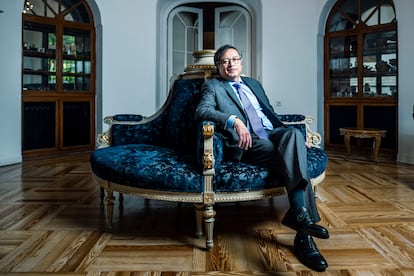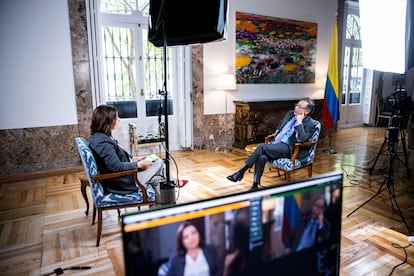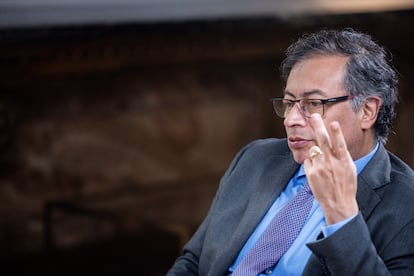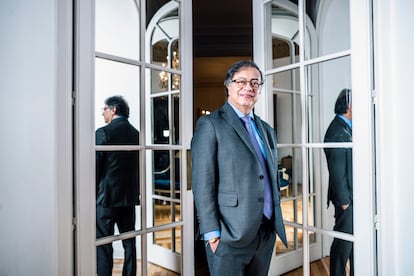Gustavo Petro: ‘Change is more difficult than we thought’
In an interview with EL PAÍS, the president of Colombia urged citizens to ‘express themselves’ to defend his government’s reforms and prevent these from being blocked by ‘very privileged groups’

He had barely landed in Spain when the president of Colombia, Gustavo Petro, 63, spoke with EL PAÍS on Tuesday at his country’s embassy in Madrid. Outside in the garden there was music playing, a smell of barbecue and people coming and going at an entrepreneurship fair organized on the occasion of the president’s visit. Petro stopped to greet people and take selfies before sitting down to answer questions about his nine months in power — a short time for a very ambitious reform program in a country that voted for change without giving him an absolute majority. Although, as Petro later noted, the main reforms have already been presented — it’s just that he is encountering so many difficulties in getting them approved. This has in turn triggered a deep crisis within his government because, as he assures, he needs a more homogeneous executive that will work for change. Petro openly confessed that it is proving more difficult than he thought it would be.
Question. You are the first leftist president in contemporary Colombia. You have been in power for just over nine months. Have you encountered resistance? Do you feel that traditional powers have organized against you?
Answer. Yes, of course. Change always provokes resistance. Being the first elected leftist president in Colombia, the spirit of resistance is high, and it comes from very privileged groups, especially because of public money. When we proposed to go back to giving greater weight to public policy, to society, to guarantee health rights, pensions... then these groups reacted, they organized themselves. They have not yet found popular support, but they have received the support of the press [and] with parties trying to win a relative majority in Congress that will prevent the laws of change from being approved. And that’s the resistance we’ve encountered so far.
Q. And despite everything, you have addressed great projects: total peace and also health, pension, labor, tax and even political reform. What will you do if you do not get a parliamentary majority to get them approved by Congress?
A. It’s the power game. Undoubtedly there is a desire for change, and there is also resistance against change. Which one will prevail? We cannot predetermine it. I have invited the population to come out and express whether they are in favor or against, because in these nine months a fundamental protagonist has been missing: the people. I want the people to express themselves; almost no country is transformed without the leading presence of the people. Let’s see if they allow it. If not, it means that the population did not see the change as a profound process, but as a passing trend. And from that perspective the government would have no prospects for success.

Q. When you talk about the population expressing itself, are you referring to street demonstrations or to calling referendums to legitimize reforms that are not approved in Congress?
A. In the Colombian Constitution, plebiscites or constituent processes always go through Congress. If you can change the laws, why the plebiscite? I hope Congress will pass the laws and fundamental changes.
Q. In the first interview you gave to an international media outlet after getting elected, you told EL PAÍS that reforms must be carried out in the first year or else they just won’t be carried out anymore. There are three months left for that first anniversary. Are there any reforms that you have not presented yet?
A. Yes, but the ones that have been presented are the fundamental ones — those that have to do with health, pensions and employment contracts. The process is slow; in fact, only one vote has been presented, which the traditional parties tried to sink. Parties that had been in the government coalition were unable to resist the pressure from the owners of capital, of public capital, that is being managed by private sectors in the fields of health, pensions...
Q. In your May Day speech, you said that Colombia is heading towards a great battle. What exactly did you mean by that?
A. Well, it’s the battle for change. Colombia has been a conservative country for a long time. The last great transformation of the country, a modernizing and democratic attempt, was under a liberal government led by Alfonso López Pumarejo in the years 1934-38, and a second government led by him that saw a lot of popular mobilization. Some very advanced reforms were presented, but the progressive forces were defeated. And the violence began and went through various phases: it became leftist, insurgent... It ended up tied to drug trafficking in recent times. There are different phases of violence that have a political origin. In 1970, a different candidate who was not from the traditional parties won the presidency and the election was stolen from him. That gave rise to the first urban armed presence of which I was a member, the M-19.
The country stopped expressing itself institutionally and derived into war. Since then we have been talking about building a peaceful road. When I call on the population to express themselves, deep down I am trying to get them out of those processes that end in violence. My choice is that. When we told people to get off the barricades and use the ballot boxes, I was listened to. The people behind the social explosion, largely Colombia’s youth, turned to the polls and gave me the victory. I am trying to give prominence to that which was expressed in the streets peacefully.

Q. That historical comparison with the period of the 1930s makes me think that you see much more resistance to change than what you told me at the beginning.
A. There is a portion of the population that does not want change. And there is a very privileged core of power that got rich by milking the State. It is a parasitic attitude that has more to do with feudalism than with capitalism. But it is what has made this group of people that I defeated at last election grow stronger.
Q. Are you afraid of failure?
A. History brings triumphs and failures. In fact, I have almost always lost. I lost during votes for laws and before that, when I was a combatant. The M-19 was the only insurgency that was beloved by the people, that’s why I’m here. My life has been one of struggle, and defeat is no stranger to me.
Q. Your term is for four years. With the current Constitution, there is no re-election. Will that not change?
A. Mathematically, a re-election turns a four-year term into eight years. There is another mathematical way, which is to turn eight years into four by doubling the 12 hours of work and making that 24 hours of work. Mathematically it is the same.
Q. So are you working with a four-year term in mind?
A. Yes.
Q. The government has just changed. The ministers of the coalition with the traditional right-wing parties are out, but also a minister that you trusted, in charge of the health portfolio. Did you make a mistake with your first Cabinet?
A. I did not build a government of my own forces. I sought a coalition government of sorts, precisely to try to secure a solid parliamentary majority. But the process did not move in that direction. On the one hand, because the parties that should have been supporting the reforms stopped doing so. They did not understand what it was to be within the government. On the other hand, some of the people that I summoned to the government dedicated themselves to cheating instead of proposing a serious dialogue. Now the government is more homogeneous, better representing the forces that won the elections. I think we are going to have a weaker parliamentary majority, but a majority nonetheless. That will make the approval of laws less challenging and perhaps provide a chance for a frank dialogue with society.
Q. One of your great projects is total peace. You coined this expression to define a very broad negotiation to try to put an end to the violence that has bled your country dry for decades, from the guerrilla groups to the criminal gangs. Do you think you will achieve it by the end of your term?
A. There is a circumstance for which we have not yet been able to find the exact cause, but which helps us. The largest cocaine consumption that existed, that of the United States, appears to have plummeted. Why? The hypothesis is that new synthetic, chemical drugs seem to be gaining the market. In the case of the U.S., it is fentanyl, perhaps the worst drug ever created, which is reaching pandemic levels. This theory is somewhat demonstrated in various regions of Colombia dedicated to coca leaf production, where demand has ceased. That gives us a chance. As it is no longer a big business the way it used to be, many of the social sectors that have been living off cocaine would now prefer another option. If we are able to provide one quickly, Colombia would begin to disconnect from the international drug market and that would in turn serve to ensure that many groups that have weapons would stop having them. Hence, almost everyone has said yes to a total peace process. It is one thing to say it and another to do it, but it starts there. Many strictly criminal gangs, those without political roots, have said they want a process. It gives me a certain degree of optimism. We need to seize the moment.
Q. Have you found a different attitude in the Biden Administration regarding the war on drugs?
A. Yes, I think the top Democratic officials in the U.S. are aware that the war failed. It has taken the lives of some 10 million people, and those figures need to be recognized. It is a huge social destruction. [It has meant] a separation within American society, the persecution of the Black population based on drugs. The most violent region in the world is not in the Middle East, it is not in Ukraine. The region that kills the most is the region through which the cocaine routes pass.
P. You have resumed diplomatic relations with Venezuela and are an active part of a negotiating effort between the government and the opposition. Why is it so difficult to reach an agreement in Venezuela between the opposition and the government?
A. There is a fear, an initial fear, and I understand it because I have also been prey to that fear. It is the belief that if the group in power loses it, they will be exterminated. The same in reverse. There is no trust at all between the opposition and the government.
Q. What should come first, free elections or the reduction of sanctions?
A. What we proposed [at a summit about Venezuela] in Bogotá is a parallel road with two rails. Gradually a plan to lift sanctions and, at the same time, moving forward in the election schedule with guarantees. Now we have to see if it can be done. The United States said it was willing to lift sanctions, which is already progress. The opposition said it was willing to have sanctions lifted if there was a concrete electoral process. And the Maduro government also said that it was willing to set an election schedule.
Q. So?
A. Well, we’ll have to see if that’s put into practice. In this, Europe can play a better role than it has played. I think that all the countries that introduced sanctions realized that they are like a boomerang. Venezuela is a rich nation thanks to oil. The United States struck that base. At first, with the invasions of the Middle East, Chávez’s allies fell; the price of oil plummeted. Later, directly against Venezuela, already under Maduro, by blocking it. That blockade produced the complete closure of the tap. The overnight drop in consumption made millions of Venezuelans feel hungry, something that had never happened before, and that created an exodus, a very large exodus without an exact count to date. Colombia receives the first impact: one million, two million people who enter the Republic and also produce destabilization. Sanctions do not work against governments, they work against people.
Q. What is the role that Europe can play with Venezuela?
A. Putting the two rails to work. Ensuring that there is a systemic and gradual lifting of sanctions, while the Maduro government advances in an electoral schedule with guarantees.
Q. You have come to a continent where there is a classic, imperialist war going on, with one country invading another. The president of Brazil, Lula da Silva, who was here last week, is leading an initiative to try to find a way out of this invasion by Putin. Do you share Lula’s initiative?
R. In general, Latin America has not taken a position. The Latin American position is that there should be a peace agreement because we have suffered an increase in hunger from all the rise in food prices. We are not interested in this war continuing, but the rhetoric against the invasion of some countries against others does not sound frank to us, when the same countries that are rejecting these invasions have carried out invasions against other countries. And I am not referring only to those in the Middle East, but to those that Latin America has suffered. You have England invading the Malvinas [Falkland Islands]. You have the United States which invaded Santo Domingo, the island of Grenada, Panama...
Q. Sure, but do the U.S. invasions justify the bombing of Ukraine?
R. The rhetoric of attacking Russia because it invades someone should have started with themselves. We once proposed that the crime of invasion be considered a crime against humanity. The U.S. objected.
Q. But we Europeans have not invaded. We have a war on our soil and a country that is asking us for help. Should we offer help to a neighboring country that is being invaded?
A. I'm not sure about that statement that Europe hasn't invaded. Europe has shielded itself in NATO, but through NATO it has invaded. Why is the invasion of Libya good and the Russian invasion of Ukraine bad?
P. They are all bad. Is this one bad too?
R. So, if they are all bad, the policy that must be defended is not to say “this one is bad” and applaud others, but to classify international aggression as a crime, no matter who does it. That would be a more serious attitude and would have the full support of Latin America, because Latin America is a territory that has suffered invasions. I told Biden that he, leading the war in Ukraine, was not going to have the same kind of world leadership that he could have if he instead led the change of national public debt for climate action. The war goes on; it even seems to get worse. That war could be easily over if we stopped seeing Ukraine as NATO territory. Then Russians and Ukrainians would have a better chance to sit down at a table and end the war.
Q. It’s hard to talk while you’re being bombed, but now we have to wrap up the interview. What have almost 10 months in power taught Gustavo Petro that he didn’t already know?
A. [Laughs] Let’s say they’ve taught me that change is more difficult than we thought. If the changes take place, it will be because the people want them. It will go as far as the people want. Not a meter more, not a meter less. As far as the people want.

Sign up for our weekly newsletter to get more English-language news coverage from EL PAÍS USA Edition
Tu suscripción se está usando en otro dispositivo
¿Quieres añadir otro usuario a tu suscripción?
Si continúas leyendo en este dispositivo, no se podrá leer en el otro.
FlechaTu suscripción se está usando en otro dispositivo y solo puedes acceder a EL PAÍS desde un dispositivo a la vez.
Si quieres compartir tu cuenta, cambia tu suscripción a la modalidad Premium, así podrás añadir otro usuario. Cada uno accederá con su propia cuenta de email, lo que os permitirá personalizar vuestra experiencia en EL PAÍS.
¿Tienes una suscripción de empresa? Accede aquí para contratar más cuentas.
En el caso de no saber quién está usando tu cuenta, te recomendamos cambiar tu contraseña aquí.
Si decides continuar compartiendo tu cuenta, este mensaje se mostrará en tu dispositivo y en el de la otra persona que está usando tu cuenta de forma indefinida, afectando a tu experiencia de lectura. Puedes consultar aquí los términos y condiciones de la suscripción digital.









































